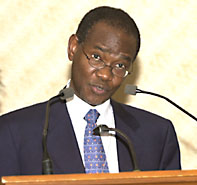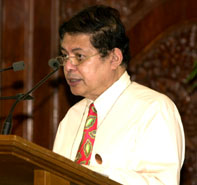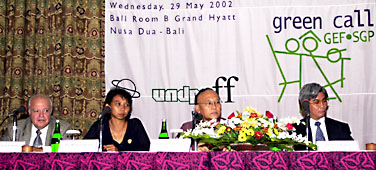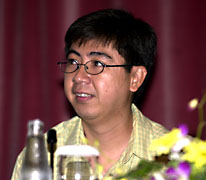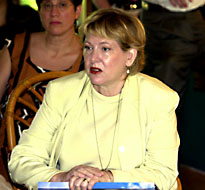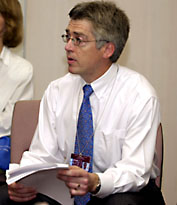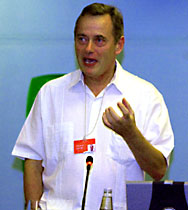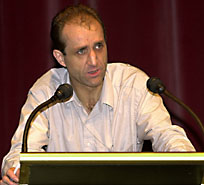|
|
|||||||||||||||||||||||||||||||||||||||||||||||||
|
|||||||||||||||||||||||||||||||||||||||||||||||||
|
Events convened on Wednesday, 29 May 2002 |
|
|
GREEN CALL:
Global Results for the Environment through Community Action at the Local
Level
This event featured videos showcasing success stories of SGP projects in
the field, followed by presentations to share lessons learned from
organizations working in community-based projects.
Yani Witjaksono, YBUL, highlighted the SGP's support for more than 100 projects in Indonesia, and expressed hope for increased collaboration with other funding agencies to support these projects. Hutton Archer, on behalf of Mohamed El-Ashry, CEO of the GEF, highlighted the SGP as an excellent and replicable success story in the GEF portfolio, and affirmed the GEF's commitment to continue its support for the SGP. John Ohiorhenuan, UN System South Africa, explained that the SGP channels small grants directly to grassroots communities and NGOs to support sustainable development on the front line, with 3,000 projects in 63 countries.
Avi Mahaningtyas, SGP Indonesia, highlighted lessons learned from community action in Indonesia, including the importance of: respect for community members as resource owners; transparency in supporting indigenous communities and local initiatives; and indigenous peoples' participation in policy making. She emphasized the need for capacity building, development of local economic models, access to information and decision-making processes, and policy dialogue. Prema Gopalan, Swayam Shikshan Prayog (SSP), highlighted SSP's partnerships with grassroots women's groups in India to build capacity for women's participation in water management. She stressed the need to scale up the partnership approach to ensure that successes do not remain isolated instances. Delfin Ganapin, Philippines National Council for Sustainable Development, emphasized that participation of grassroots organizations in policy making is crucial for good governance. Noting that NGOs have the potential to accomplish more than national agencies, he stressed the need for massive capacity development, and for a shift from centralized governance to local empowerment. Discussion: Participants highlighted, inter alia: the crucial role of volunteers; the benefits of local initiatives in many countries; the agility and country-driven nature of the SGP as keys to its success; the need to ensure gender assessment in the SGP; and the importance of partnerships between governments and local initiatives. Participants underscored the need to ensure that UNDP's Capacity 21 and the SGP are strengthened in PrepCom IV's final text, as they are crucial country-driven tools for action to achieve sustainable development.
|
|
|
Grassroots initiatives in the forest: Success stories in sustainable development Presented by the Center for International Forestry Research (CIFOR), UK Department for International Development (DFID), and the International Fund for Agricultural Development (IFAD)
Ashok Babu, India, described a Joint Forest Management Programme in Orissa, India. He explained how this self-initiated community forest management programme, based on scientific rules and regulations, helped to create self-sustained and dynamic community institutions, improve livelihoods, and revive forests. Arif Aliadi, Indonesian Tropical Institute, presented lessons learned from forest governance based on multi-stakeholder dialogue in West Java. He said that communities' rights are often neglected, and stressed the need for, inter alia: a balance of power among communities, local governments and private concessionaries; transparency and dialogue; and clarity of rights and responsibilities. Sith Ying Sanchez, Coordinating Association of Peasant and Indigenous Communal Agroforestry (ACICAFOC), presented a case study of the world's largest community-managed forest certified by the Forest Stewardship Council. She said that community forest management resulted in poverty reduction, the generation of approximately 40,000 jobs, and a reduction in social conflicts. She proposed the formation of an umbrella certification mechanism for community forest management. Yvan Biot, DFID, said that successful self-initiated efforts for community-based forest management are challenging the myth that the poor degrade their environment, and stressed the need to provide communities with opportunities to use and manage their resources and environment. He also stressed, inter alia: the importance of joint forest management, capacity building in legal systems, and multi-stakeholder dialogue.
|
|
|
Type II outcomes Presented by the US Government
Jonathan Margolis, US
Department of State, introduced this event on US involvement in Type II
outcomes and focal areas for partnership arrangements.
Jan McAlpine, US Department of State, discussed partnership opportunities in the area of forests. She highlighted the Collaborative Partnership on Forests, and US partnership arrangements in the Congo Basin and the Amazon, and emphasized illegal logging as a priority area for action. Griff Thompson, US Agency for International Development (USAID), lauded the "groundswell of recognition" since UNCED of the importance of energy, and highlighted the Global Village Energy Partnership as a key Type II initiative. John Borrazzo, USAID, said that partnerships have always been central to health-related activities, and noted that the US is well positioned to take a leadership role in this area, in part as a result of new funding available both bilaterally and through international partnerships such as the Global Fund to Fight AIDS, Tuberculosis and Malaria. Aaron Salzberg, US Department of State, underscored the strong connection between water and health issues, and highlighted the priority of access to safe drinking water and sanitation. Discussion: Participants raised questions regarding, inter alia: water privatization; the Global Development Alliance; genetically modified organisms; options for the provision of modern energy services; legal arrangements in partnerships; a framework for coordinating Type II initiatives; UN mainstreaming of partnerships; and good governance.
|
|
|
Research partnerships for sustainable development Presented by the Regional and International Networking Group (RING) Alliance of sustainable development policy research institutions
Barry Dalal-Clayton, International Institute for Environment and Development (IIED), outlined work being undertaken to assist countries in developing national sustainable development strategies. He noted that a detailed resource book on sustainable development strategies, which outlines methodologies and analytical processes, will be launched at the WSSD. Rubens Born, Vitae Civilis, described case studies being undertaken by his organization to identify criteria for the introduction into Brazilian policy of economic instruments to enable payment for environmental services. Adil Najam, Sustainable Development Policy Institute, presented a Southern perspective for rethinking sustainable development research. He outlined Southern frustrations with the last ten years of global environmental negotiations, including the unfulfilled promises of additionality, common but differentiated responsibility, and the polluter pays principle, as well as the proliferation of negotiations and negotiation fatigue. He said challenges for the South include the need to: define a proactive agenda for sustainable development; clean up their own act; expand the fora for pursuing agendas beyond MEAs; forge alliances and influence people, particularly civil society in the South; redefine power; and organize itself. He stressed that the new Southern agenda will need to come from the South, and tackle new issues and forge new partnerships. Discussion: In the ensuing discussion, participants debated the existence of "a Southern agenda," given the multitude of Southern countries and concerns, and underscored the need for research on how to build capacity for research.
|
|
|
The WSSD WaterDome Presented by the WaterDome Organizing Committee This event presented the WaterDome, a venue at the WSSD that will be
devoted entirely to water issues.
|
|
|
Waiting for delivery: SPAC Watch Report on progress towards sustainable consumption and production Presented by the Northern Alliance for Sustainability (ANPED), Citizen Network, Consumer International, and the International Coalition for Sustainable Production and Consumption
Bjarne Pedersen, Consumer International, recommended that the WSSD: express strong political will to strengthen the implementation of sustainable production and consumption policies in a transparent and participatory way; create a ten-year work programme with time-bound goals and targets and monitoring to improve understanding and implementation of integrated sustainable production and consumption policies; and highlight sustainable consumption and production patterns as the key to poverty eradication. Sander van Bennekom, ANPED, described the negative impacts of economic and fiscal policies on sustainable production and consumption. He stressed the need for: a fundamental change in the economic regime; linkages between research on financial instruments and political processes; and transparency in government subsidies and export credit policies. Arjun Dutta, Consumer Unity and Trust Society, emphasized that advertising remains a driving force for unsustainable production and consumption, and stressed the need for, inter alia: legislation to regulate advertising; promotion and aggressive marketing of independently verified ecolabels rather than self-declared claims; promotion of environmentally friendly products; environmentally sensitive taxation; funding for research and advertising campaigns promoting sustainable production and consumption; independent review and verification of self-regulated advertisers' codes of conduct; innovative awareness and education campaigns; and promotion of traditional values. Simone Lovera, Global Forest Coalition, highlighted the lack of attention to issues of sustainable consumption in forest-related debates, which she attributed to the fact that international negotiations on forests are dominated by the self-regulated forest industry, and called for institutional change and independent regulation.
|
|
|
|
|
|
|
|
The Earth Negotiations Bulletin (ENB) on the side is a special publication of the International Institute for Sustainable Development (IISD) in cooperation with the United Nations Development Programme (UNDP). The Editor of ENB on the side is Kira Schmidt kira@iisd.org.This issue has been written by Tamilla Held tamilla@iisd.org, Jenny Mandel jenny@iisd.org and Kira Schmidt kira@iisd.org. The Digital Editors are Andrei Henry andrei@iisd.org, Leila Mead leila@iisd.org, and Diego Noguera diego@iisd.org. Funding for publication of ENB on the Side at PC-IV is provided by UNDP. The opinions expressed in ENB on the Side are those of the authors and do not necessarily reflect the views of IISD and funders. Excerpts from ENB on the Side may be used in non-commercial publications only and only with appropriate academic citation. For permission to use this material in commercial publications, contact the Managing Editor at kimo@iisd.org. Electronic versions of issues of ENB on the Side from WSSD PC-IV can be found on the Linkages website at http://enb.iisd.org/2002/pc4/enbots/. |
|
|
| © 2002, IISD. All rights reserved. |
|





